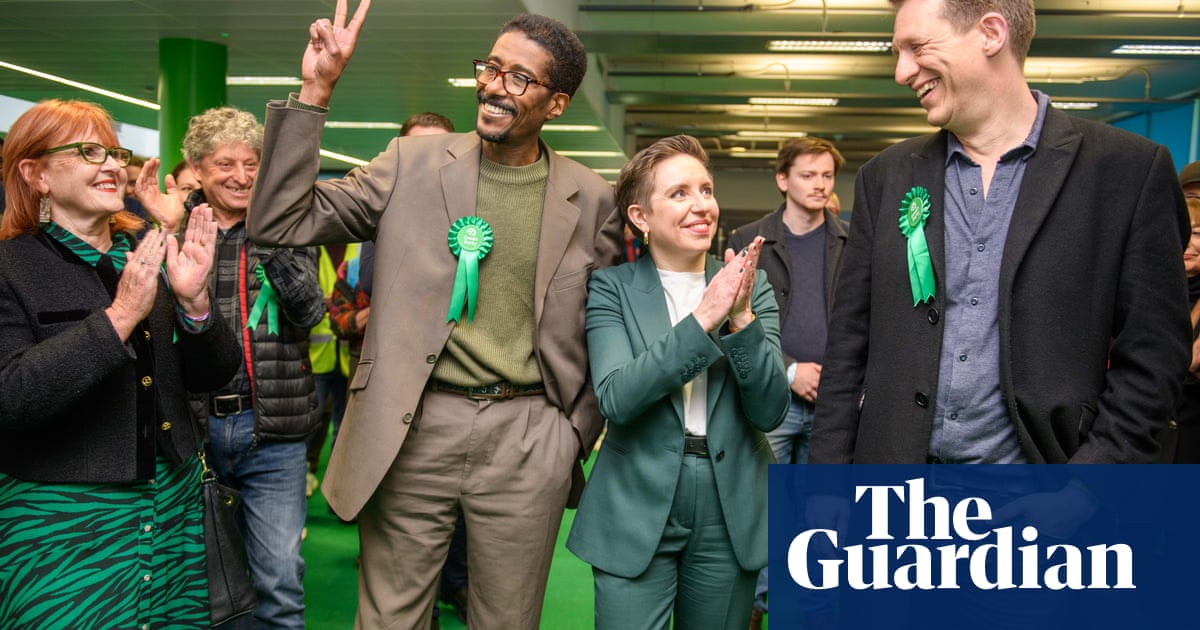
The Green party was heading for a record number of councillors in local elections across England, celebrating significant gains in places where it already had a firm foothold but also winning for the first time in inner city and rural areas.Party officials said they believed the Greens were on track to finish with more than 800 members on more than 170 councils.The Greens were delighted to win first seats on councils including Newcastle upon Tyne, Sefton in Merseyside, Redditch in Worcestershire, and South Norfolk. It became the largest party on Hastings borough council, moving up from fourth place to first.Carla Denyer celebrates with party members as news of a hold in the Cotham ward in Bristol is announced. Photograph: Adrian Sherratt/The GuardianCo-leader Adrian Ramsay, said: “We’ve had a really encouraging set of results, building on what we’ve seen over the last four sets of local elections where we have gained record numbers of Green councillors each time.”He said the party was pleased to have won seats in places such as South Tyneside, Exeter, Peterborough and Colchester. “That spread of seats, winning seats from Labour and from the Conservatives in rural areas and in urban areas, really shows the depth and breadth of support the Green party has.”Asked why he thought the party was breaking through in places such as Newcastle, Ramsay said: “People are looking for a change and looking for a positive change, looking for councillors who represent them well on local issues, and what we’ve shown up and down the country is the practical impacts that Green councillors can make in being an advocate for their communities on everything from protecting green spaces to defending public services to pressing for more council housing.“These are things that matter to people right around the country and increasingly Greens have a strong track record of winning seats in local government, being strong local representatives, playing a key role in many ruling administrations.”Carla Denyer is interviewed on election night. Photograph: Adrian Sherratt/The GuardianOne of the Greens’ key targets was Bristol, where it was the biggest party but not in the administration because Labour’s directly elected mayor, Marvin Rees, was in charge. But the mayoral post was scrapped, clearing the way for the Greens to fight for a place running the city.An early result there in the Hotwells and Harbourside ward was encouraging. Patrick McAllister, who won his seat in a byelection last year by 26 votes, increased the margin of victory to 638.The Greens’ campaign in Bristol has been marred after the government’s antisemitism adviser, Lord Mann, raised concerns about posts from two of its candidates.skip past newsletter promotionGet the day’s headlines and highlights emailed direct to you every morningPrivacy Notice: Newsletters may contain info about charities, online ads, and content funded by outside parties. For more information see our Privacy Policy. We use Google reCaptcha to protect our website and the Google Privacy Policy and Terms of Service apply.after newsletter promotionSpeaking to the Guardian in Bristol, Carla Denyer, the party’s other co-leader, said: “As soon as we were made aware of those issues we spoke to the candidates and took the actions we needed. The posts weren’t in line with Green party values. We’ve always been really clear to condemn the Hamas attacks. I’m satisfied it’s dealt with.”Asked if the party’s strong stance on a Gaza ceasefire had won over voters, Denyer said: “A lot of people are thinking about who they trust to make decisions on a local level about providing essential local services. But there is no doubt our stance on national and international issues also affected how people chose to vote. We had a lot of voters bringing up Labour’s disappointing positions on Gaza and the £28m climate change investment.”Denyer, who is hoping to win a Westminster seat at the general election in Bristol, said that unlike Labour the Greens would be willing to work with other parties in the city. “Cross party cooperation is woven into Green party principles,” she said.The Greens hope the council results bode well for the general election, when it also aims to beat the Tories in North Herefordshire and Waveney Valley in East Anglia.The political scientist James Dennison, an expert on the Greens, said: “It looks like a great result [in the local elections]. Let’s see the number of seats but this probably means further establishment of the party at the local level and thus a basis for geographically focused Westminster campaigns. The clear Muslim shift to the Greens is another social group to add to their electoral coalition – environmentalists, protest voters, Corbynistas, [and the] economically struggling in certain historic Tory safe seats.”
Source link





